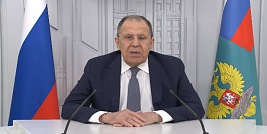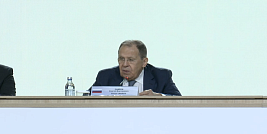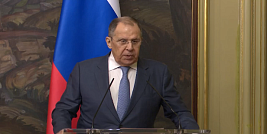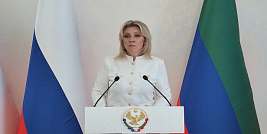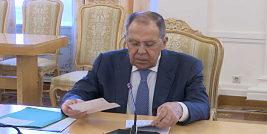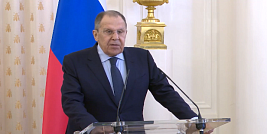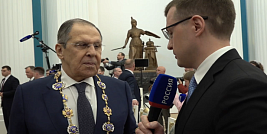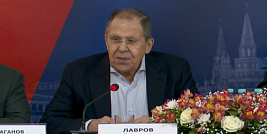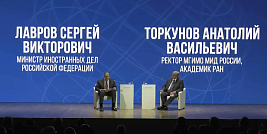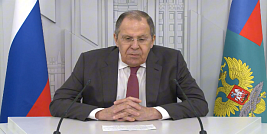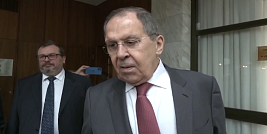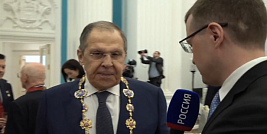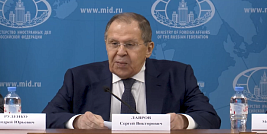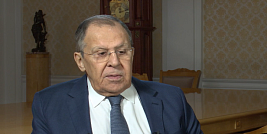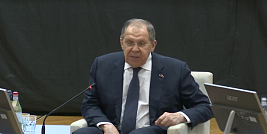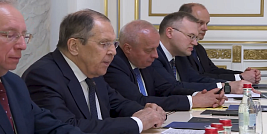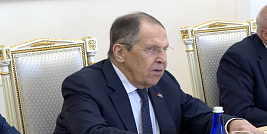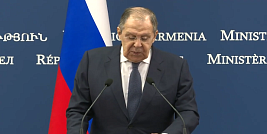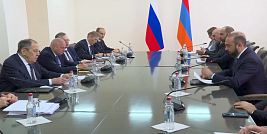Foreign Minister Sergey Lavrov’s remarks and answers to media questions at a joint news conference following talks with Foreign Minister of the Republic of Türkiye Hakan Fidan, Moscow, May 27, 2025
Good afternoon,
We have held very productive and useful talks with Minister of Foreign Affairs of the Republic of Türkiye Hakan Fidan. We have known each other for a long while since the time my Turkish counterpart headed the National Intelligence Organisation of his country. We maintain regular contacts that always make it possible for us to discuss in detail issues of importance for promoting our bilateral agenda and collaboration on regional and global problems.
In April, we met on the sidelines of the Antalya Diplomacy Forum, a popular and prestigious platform for international politicians and political scientists. In February before that we met during my visit to Ankara. We often talk over the phone. So, our contacts are regular indeed. This helps to implement the agenda that our presidents define at their meetings.
Today, we have confirmed our shared interest in strengthening Russian-Turkish partnership and our common commitment to expanding spheres of interaction and addressing issues that inevitably arise in relations between such countries as Russia and Türkiye, the more so in a situation where the West is deliberately seeking to introduce illegitimate complications thereto. While meeting with Mr Hakan Fidan in the Kremlin yesterday, President of Russia Vladimir Putin reaffirmed our resolve to promote a positive agenda and practical cooperation projects (they are quite extensive), despite the attempts to restrict Russia and Türkiye’s legitimate rights to developing this interaction.
We have a firm historical foundation. We also mentioned this yesterday. May 25 marked the 33th anniversary since the signing of the Agreement on the Foundations of Relations between the Russian Federation and the Republic of Türkiye. Quite soon, on June 3, we will celebrate the 105th anniversary of diplomatic relations between Soviet Russia and the Turkey of Mustafa Kemal Atatürk. Today, we have discussed prospects for strengthening bilateral cooperation in most different areas.
As I said, we have focused on implementing agreements reached at the highest level. We welcomed the dynamic development of cooperation in energy. The Rosatom State Corporation continues to build the Akkuyu nuclear power plant. We also discussed operation and security of the Turk Stream and Blue Stream pipelines against the background of unending provocations and threats from the Kiev regime.
We noted a steady growth of trade that exceeded $52 billion last year. We will also promote other lines in practical cooperation and diversify our material ties.
We are preparing the next, 19th, meeting of the Joint Intergovernmental Commission on Trade and Economic Cooperation to be held in Moscow in late June. We have agreed that our ministries will facilitate the success of this important event in close contact with related agencies – economic, trade, and financial.
Russian citizens like going on holiday to Türkiye. As I understand, last year, the number of Russian holidaymakers visiting Türkiye reached record-breaking levels, compared to other countries. We welcome this commitment. In this connection, we devote great attention to ensuring the safety of our citizens at Türkiye resorts, especially in the context of the upcoming tourism season.
We are ready to expand cooperation between our Ministry for Civil Defence, Emergencies and Disaster Relief and Türkiye’s Ministry of Agriculture and Forestry on issues linked with the need to jointly extinguish and prevent wildfires and other natural disasters.
We have reaffirmed our approaches towards international affairs; these approaches note the advisability and need for close dialogue on Syria. Both sides emphasised their commitment to respecting state sovereignty, political unity and territorial integrity of the Syrian Arab Republic. They reaffirmed the importance of supporting Syrian authorities in overcoming serious challenges, encountered by them during the transitional period.
Russia and Türkiye are interested in expanding cooperation on other Middle East and North African issues, including the situation in Libya which is becoming exacerbated once again. We agreed to exercise our influence on Libyan parties for the sake of avoiding another aggravation fraught with resumption of hostilities.
Russia and Türkiye voice a common position on the Palestinian issue. We believe that developments in Gaza and on the West Bank are unacceptable. Prospects for establishing a Palestinian state (as required by a UN resolution) are deliberately destroyed by creating “facts on the ground.” Multiple civilians have already been killed or impacted, and their number continues to increase. We will exercise our entire influence for finding options to end this violence and reinstating agreements that were reached, that seemed able to reliably guarantee a ceasefire but were later violated.
In turn, Russia will closely cooperate with the Arab League and the Organisation of Islamic Cooperation, currently chaired by Türkiye, in order to use our common authority and prestige and capabilities for (it would be no exaggeration to say) ending a profound disaster.
We have accumulated experience of collaborating in the 3 + 3 format in the South Caucasus. The format comprises three regional countries (Armenia, Azerbaijan and Georgia), as well as three big neighbours (Russia, Türkiye and Iran), and has already proved effective. We will continue to utilise it.
Certainly, we discussed the situation in Ukraine, just like during yesterday’s meeting with President Vladimir Putin, primarily in the context of evaluating direct Russian-Ukrainian talks, held on May 16, 2025 in Istanbul. They were initiated following a telephone call between President of Russia Vladimir Putin and US President Donald Trump and supported by President of Türkiye Recep Tayyip Erdogan and my colleague.
We are grateful for Türkiye’s readiness to continue facilitating these talks and the entire peace settlement. Our position is well-known. President of Russia Vladimir Putin has recently reiterated it during his public addresses. This implies that the success of the talks will directly depend on our ability to eliminate the well-known root causes of the conflict during these talks.
I believe that we have had a useful conversation. We will continue to maintain contact, including on issues of Black Sea navigation safety (that we have also discussed today). Russia is interested in fulfilling all agreements, reached on this issue over the past three years. Unfortunately, it is impossible to say the same about our Ukrainian neighbours. Their Western patrons allow them to do whatever they want and are inciting them in every way. The position of European countries I particularly obvious.
Our dialogue will continue. I assume that Russia-Türkiye relations have a good future.
Question (retranslated from Turkish): You said that Ukraine persisted with its attacks during the three-day ceasefire. Russia closed its air space. Does this mean that Russia is ready to continue hostilities?
There have been rumours that the United States wants Vladimir Medinsky to be replaced by someone else to represent Russia, considering his position. In addition, there were rumours about a prisoner exchange between Russia and the United States in the coming days. Will Türkiye be involved?
Sergey Lavrov: If the interpretation was correct, you are asking about the strikes targeting the Russian territory. Ukraine carried them out during the ceasefires which were announced for Easter and on the occasion of the 80th anniversary of Victory in the Great Patriotic War. Before that, there was an agreement dealing with strikes against energy facilities – it introduced a moratorium on these attacks. This initiative came from President Donald Trump and resulted from a telephone conversation with the President of Russia. We supported a month-long moratorium by refraining from targeting energy infrastructure.
However, throughout all these periods and no matter whether you call them ceasefires, truces or moratoriums, or any other way, for this matter, the Ukrainian regime persisted with its targeted and intentional strikes against energy infrastructure and other civilian sites, residential buildings, shops, kindergartens, schools and civilians in general. Unfortunately, there were, and there still are, victims among them, people get killed and wounded in these attacks.
Everyone can see that the Western elite, including the United States, and primarily Europe have been trying to turn a blind eye to these developments. The fact that those whose job consists of briefing their leaders about what happens with the Ukraine crisis have been failing to report the truth means that they either do not want to know this truth or are seeking to conceal it. Moreover, these European leaders believe that this crisis is their main issue and call for inflicting what they call a strategic defeat on Russia no matter the cost.
That said, I am convinced that those camping on Russia-hating positions, those who are trying to force the US to revert to Biden’s playbook by adopting the path-to-war position – they know very well what is going on.
The fact that Russia carried out retaliatory strikes was a natural thing to do in this context. A criminal deserves punishment. I can assure you that Vladimir Zelensky and his junta know what they did to deserve it, just as they know that unlike their strikes, our troops targeted only military sites and facilities used by Ukraine’s armed forces.
As for the rumours on the United States asking to replace Russia’s negotiator, we have an adequate conversation with the United States, unlike what we had under Joe Biden, but this time is gone. If the United States wants to send us a message, it knows how to do it without humiliating itself by spreading rumours.
If we mention Mr Vladimir Medinsky as a person who heads Russia’s negotiating team, he was appointed by President Vladimir Putin, in case any of you had any doubts, rather than by any other foreign leader.
I can confirm that during their latest telephone conversation, our two leaders agreed to hold a prisoner exchange between the United States and Russia. The competent agencies have been coordinating the details, for understandable reasons.
Question: Given the European Union’s uncompromising stance on the Ukrainian crisis, do you believe Brussels may attempt to disrupt the recently resumed negotiation process between Russia and Ukraine?
Sergey Lavrov: I do not merely believe Brussels will attempt to disrupt the resumed negotiation process – I see these attempts, as any objective observer would. They have escalated to utterly unprecedented actions, statements, and appeals. Above all, what stands out is their bewilderment and nervousness – stemming from the realisation that they, the European hawks led by France, Britain, Germany, and Poland, lack the strength to sustain this war. They are terrified, to the point of mortal dread, that the United States might wash its hands of them and declare, “You stirred this mess with Joe Biden – now you must deal with it yourselves.”
President of the United States Donald Trump has already stated that this is not his war. He is committed to ensuring negotiations between Russia and Ukraine continue. This was a joint initiative with President of Russia Vladimir Putin.
The individuals we mentioned today are, of course, trying to obstruct this. Because if the war were to suddenly end, they would face disgrace, their political careers ending in ignominy. They prioritise their cheap, selfish interests above those of their own people – demanding that their citizens suffer, pay three to four times more for energy and goods, and submit to a regime that generously opens EU markets to Ukrainian products. They demand their people accept far more than that.
Including outright lies and electoral manipulation in countries where sensible leaders – rather than the “kin” and supporters of those currently ruling united Europe – might come to power. This includes Brussels, where the European Commission performs its functions in a rather peculiar manner. It is a technical body tasked with overseeing and enforcing decisions made by member states. The European Commission has no authority to impose anything not approved by them – yet they attempt to do so with particular ferocity.
Question: When and where might the second round of Russian-Ukrainian negotiations take place?
Sergey Lavrov: If you ask me, I would once again turn to our Turkish friends. Istanbul is a good choice.
Question (retranslated from Turkish): The rhetoric of US President Donald Trump has been shifting. What does this signify? At times, he speaks sharply about President of Russia Vladimir Putin; at others, he offers kind words. Can this be interpreted as part of a strategic objective?
Sergey Lavrov: Regarding what you referred to as “shifts” in President Donald Trump’s statements –
We perceive them as shifts in President Donald Trump’s statements. Changes in rhetoric are common among many world leaders.
For instance, until recently, all of Europe was shouting in unison: “No ceasefire! Pump Ukraine full of weapons! That is what must be done – and crush Russia on the battlefield.” And what are they shouting now? “Ceasefire immediately, without preconditions!” Yet President of France Emmanuel Macron adds that they will not stop supplying weapons to Ukraine during this very ceasefire they demand from Russia. There you have it – the full extent of their rhetoric.
US President Donald Trump is a man who seeks outcomes. When he perceives that his endeavours to advance a settlement – as agreed with President of Russia Vladimir Putin, including the meeting in Istanbul and the arrangement to exchange memoranda between Russia and Ukraine, which would contain not merely baseless demands as a pretext for continuing an aggressive anti-Russian policy, but concrete components of a solution aimed at addressing the root causes of the problem – when he observes that a group of European representatives has commenced sabotaging these efforts by inciting Ukraine towards utterly reckless actions, including drone attacks on Moscow, our other cities, and even targeting the helicopter of the President of the Russian Federation, naturally, certain emotions may manifest in him. As a man who does not tolerate impediments in the pursuit of noble objectives, he develops certain evaluations, a particular rhetoric. The key here is not to focus on the rhetoric but to ensure that Europe ceases its sabotage of the movement towards peace – a process supported by both the United States and Türkiye, and one to which the Russian Federation remains fully committed. This was underscored yesterday by President of Russia Vladimir Putin in his discussions with Minister of Foreign Affairs of Türkiye Hakan Fidan, reiterating our readiness to resume the negotiation process with the Ukrainian delegation as soon as the exchange of memoranda takes place.
Question (retranslated from Turkish): Germany said it was lifting restrictions on using long-range missiles to strike Russia. What do you make of that?
Sergey Lavrov: This statement by Mr Merz once again highlights the level of competence of the people who have come to power in Europe. Yesterday, he made a grand statement to the effect that there would be no restrictions on the range of strikes from that day on and forever. He spoke not only for himself, but also for France, the United Kingdom, and the United States. An hour later, the Vice-Chancellor of Germany said that this matter had never been even discussed. Representatives of the Bundeswehr had the same to say. Mr Merz apparently figured out what it was that he had said, and said that he was not talking about a new decision, but rather a decision made by the previous Berlin administration.
This once again leads us to the conclusion that the decision to let Ukraine do whatever it wants - at least within certain limits - regarding strikes on targets in Russia, had been made long ago. It was simply kept secret.
French Foreign Minister Jean-Noel Barrot recently with French-style grandeur said at a news conference that France was not at war with the Russian people or Russia, but was just supporting the sovereignty, independence, and territorial integrity of Ukraine and its armed forces. He is not telling the truth. France is at war with Russia, because its long-range missiles are being used by Nazi Kiev regime to attack Russian territory, mostly, civilian targets. A Frenchman, if he loves his country and believes he represents its interests, would be better off if he were guided by the long-standing motto of all freedom-loving French politicians and people in general which is liberty, equality, and fraternity. That includes human rights, which France loudly proclaims with regard to any situation anywhere around the world, except the Ukraine conflict. France says nothing about the fact that in addition to sovereignty, independence, and territorial integrity, there are also human rights. Ukraine is the only country in the world that has banned the Russian language from use in all areas of life. There is no such other place around the world, no other country other than Ukraine.
European Commissioner for Enlargement Marta Kos said Ukraine had completed its homework and was ready to start accession talks with the EU. In fact, she has acknowledged that this homework included the law-based eradication of the Russian language before allowing these Nazis to sit down at a negotiating table with the European Union. Duly noted.
I apologise for digressing, but everything is interrelated. The key connection is that Europe has once again found itself a Nazi banner in order to embark on yet another disastrous and dead-end adventure of trying to inflict a strategic defeat on Russia. Having just marked the 80th anniversary of defeating Hitler’s Nazism, it is rather telling for us to hear the German leader say that Germany will reclaim its position as the leading military power in Europe. Apparently, history taught these people nothing.
Question: How will the lifting of US sanctions on Syria affect Russia-Syria relations? How closely is our country cooperating with the new Syrian government?
Sergey Lavrov: We always condemned sanctions on Syria and demanded to lift them. Even though it was formally announced that the sanctions were imposed on the former President Bashar al-Assad’s regime, in reality, they directly and painfully affected all strata of Syrian society.
In December 2024, power in Syria passed into the hands of the transitional period President Ahmed al-Sharaa. Together with the majority of Arab and Islamic countries, we advocated for these sanctions to be lifted, just as we continue to advocate for the return of the frozen assets belonging to the Afghan people.
We welcome the fact that President Trump recognised the need for making such a step, because the Syrian people were suffering. Europe, too, driven by its noble aspirations seems to have followed suit after seeing the United States lift sanctions. Better late than never, as the saying goes.
We are cooperating with the new Syrian authorities. President Putin spoke with President al-Sharaa by telephone and, following the call, sent him a message in March outlining our vision for adjusting trade, economic, and other relations given the new circumstances.
A Russian interagency delegation visited Damascus in January and held talks with President Ahmed al-Sharaa. At the kind invitation of my friend Hakan Fidan, Syrian Foreign Minister Asaad al-Shibani, Minister Hakan Fidan, and I met in Antalya in April 2025. The Syrian Minister was invited to visit Russia.
We believe it is important to participate in the efforts to support the current authorities in order to prevent another outbreak of the conflict and the break-up of Syria.
